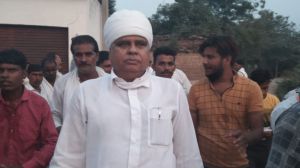Raw incompetence
As the name suggests, international terrorism occurs across the globe. Most of those masterminding terrorism in the country live and operate...

As the name suggests, international terrorism occurs across the globe. Most of those masterminding terrorism in the country live and operate from other countries. Our efforts to fight terrorism seem to be confined to our own territorial space. This means that terrorist organisations plan, train and manoeuvre their resources outside India and our forces come into play only after the mastermind has finished what he has to do.
So Prabhakaran, after putting together a complex plan to assassinate Rajiv Gandhi, went about his business for 11 years with no interference from the Indian state. Encouraged by our docility, a number of other individuals waged war on the Indian state from outside the country. They include one don who was regularly visible at cricket matches India played in Sharjah. One enterprising Indian journalist even photographed the residence of the don who masterminded the Mumbai blasts and who lived a calm and comfortable life in Karachi. Azhar Masood, for whose sake an Indian Airlines aircraft was hijacked, has a known residential address in Karachi, got married at a public ceremony and lives happily ever after. Occasionally he is 8220;arrested8221; by the Pakistani government and ensconced in a state guest house in Bahawalpur where his ancestral home is, so he can visit relatives. Hafiz Sayed, the head of the Lashkar-e-Toiba who planned the worst killings in India from Muridke, just outside Lahore, has been a state guest for over a year and was recently released by a Pakistani court. Instead of celebrating his release since he has now become accessible to 8220;elimination8221;, the Indian government is predictably gloomy.
The efforts of the Indian state against all these individuals and lately Anis Dawood are reminiscent of the late 19th century, when diplomatic missions would be cabled to 8220;raise the issue with the host governments8221;. In those days when sending a punitive force to Yemen, for instance, meant a voyage of at least 14 days, diplomats may have been the best instrument available. Today, an Al-Qaeda terrorist leader travelling in a vehicle in Yemen was simply taken out by an American unmanned aerial vehicle. President Bush has now signed the authorisation for the CIA to 8220;eliminate8221; known terrorist leaders in other countries.
Our government turns ineffectually to the foreign office whenever confronted with a security threat to the country. Between 1982 and 1989, while the Pakistanis were making a bomb, India8217;s sole effort was to beg, plead and cajole the Americans to get them to stop. Today we are back at the same pathetic hand-wringing, breast-beating and wailing in front of the White House to lean on Musharraf. The Rs 5000-odd crore spent on RAW and Rs 50,000 crore spent on the armed forces don8217;t seem to get the country any returns in this area. For a start, what about telling these organisations to come up with some answers or face a 20 per cent budget cut, money that could build Vajpayee8217;s diamond of roads in two years flat? Not many know that when Pakistan was importing nuclear material from Europe in the 8217;80s, three companies in Switzerland and Germany were bombed and told to desist. Who did it? Not us, some well-wishers.
International terrorism is exactly what it says. The terrorists are all over the place, sometimes with open host nation support, sometimes clandestine support 8212; and often the state is too weak to interfere. In each case, India has little option but to act directly. This is why countries have clandestine organisations and 8220;special8221; forces. India has both, but is unable to operationalise or direct them effectively. It is truly lamentable that most of those who wage war against the Indian state are high-profile bumblers whose ego and bravado make them vulnerable, except for an odd canny old fox like Prabhakaran. Our fight has to be fought with our own resources. The Portuguese courts, Dubai police, Interpol and the Americans in Pakistan have their own work to do and our brahminical approach of getting others to dirty their fingers in what is essentially our mess is simply not going to work. Espionage leading to dirty tricks may be difficult in Lahore, but the ease with which the ISI functions in Nepal, the Al-Qaeda finds shelter in Bangladesh and criminals wanted in India can hide in Dubai is a symptom of Indian incompetence. Clandestine operations officially don8217;t happen. A country denies it ever did anything clandestine and those who are paid to do these deniable things have an immense budget. So where are the returns?
The armed forces must shoulder a share of the blame. For too long have defence ministry handouts been advertising how the armed forces preserve India8217;s territorial integrity. In the 21st century this is a down right stupid claim for a country the size of India to make. No one claims our territory. What the Chinese have, they already have. Our strategic frontiers go far beyond the territorial limits of the Republic and it is time the armed forces provided a flexible, multi-level transnational capability 8212; whether it is to credibly coerce a hostile government or to make a criminal disappear from Dubai. Any such capability will be a tri-service one under a joint force commander, with an independent budget. The great tragedy is that 90 per cent of the armed forces budget goes to single service projections 8212; what the country needs desperately today seems to be the last priority.
What India needs is a Special Operations Command composed of units from the three services under the Integrated Defence Staff. Then individuals who wage war on India could be made to disappear, and the country spared the embarrassment of Musharraf trashing its demand for the extradition of 22 criminals. The recent move to raise four more battalions of special forces does not answer the urgent need of the country, nor does the report that they are to be equipped with 8220;modern8221; weapons get us anywhere nearer the solution. We have always had enough special forces to act, but never the means of getting them into hostile territory at night and getting them out the same night. Only an integrated joint staff could do anything that complex; that staff has been put in place and all it needs now is for each of the armed forces to surrender some of its sovereignty and money, to the integrated defence staff, so that they can do what India needs.
- 01
- 02
- 03
- 04
- 05































